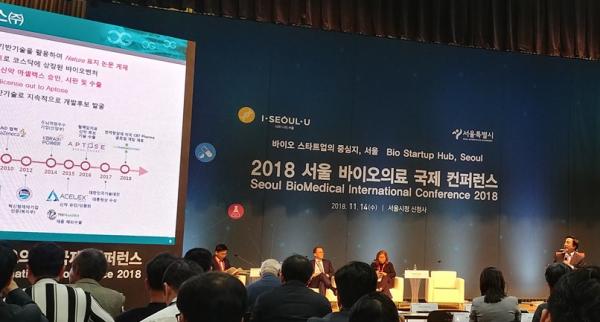Korean biotech and pharmaceutical businesses should cooperate with multinational players for future growth, healthcare experts said.
Rather than taking up a partial role for clinical research or sales, they should participate in multinationals’ open innovation programs or co-promotion activities to enlarge the industrial pie and grow rapidly together, they noted.
Their advice came at the “Seoul BioMedical International Conference 2018,” organized by the Seoul Metropolitan Government and held at the City Hall on Wednesday. Participants of the conference synchronized their voice for collaboration with global pharmaceutical firms.

CrystalGenomics Executive Vice President Chung In-chul took an example of licensing-out the Korean firm’s leukemia treatment CG-806 to Aptose Biosciences of the U.S. in 2016 to emphasize the need for teaming up with a foreign company.
“When we were negotiating with Aptose, CG-806 was at the preclinical stage. We had an internal discussion on whether we should delay pursuing a license-out deal until we test the drug at a phase-2a. The more the study progressed, the more we could increase the upfront payment and the entire deal value,” Chung said.
However, CrystalGenomics concluded that an early licensing out would be better, he recalled.
“CrystalGenomics saw that Aptose had a high level of expertise in leukemia and concluded that collaboration with the U.S. firm would accelerate the procedure for clinical trials in the U.S.,” Chung said. “In hindsight, it was a good decision. The result of the preclinical trial on the treatment that Aptose conducted came out better than the one we did.”
The positive result of the preclinical study, published in U.S. journals, raised the brand recognition of CrystalGenomics, he said.
Chung went on to say that cooperating with multinational firms gives an opportunity for local companies to learn professional know-how.
Chang Hemmie, co-chair and partner at Foley Hoag’s Life Sciences Group of the U.S., said if Korean companies wanted to grow as a genuinely competitive pharmaceutical and biotech firm, they should be able to sell products and learn from those who were good at it.
“Co-promotion is important. Through co-promotion, they can learn European business and American business,” she said.
Bruce Roberts, managing director at RM Global Partners of the U.S., said CrystalGenomics was an excellent example of what kind of change and development the Korean biotech industry has experienced.
“The company built a good financial strategy from the beginning, and it excellently utilized Korea’s unique IPO system (technology exception policy),” Roberts said. The technology exception policy makes listing easier for companies with advanced technologies and high growth potentials.
He added that CrystalGenomics kept seeking growth by getting new pipeline opportunities without selling the company, even after the development of Acelex, an osteoarthritis treatment.

